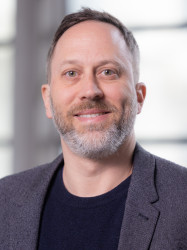Overview
RESEARCH Interests
The interaction of solutes with dislocations in engineering problems such as delayed hydride cracking (Zr alloys, nuclear industry) and stress assisted grain boundary oxidation (Ti alloys, aerospace industry).
Size effects in crystalline materials (e.g. grain-size effects, single crystal specimen effects as in micro-pillars, micro-cantilevers and thin films).
The theory of acoustic metamaterials.
Dislocation mechanics of the Portevin-Le Chatelier effect.
Atomistic modelling of dislocations moving at high speeds (mobility laws and the sound barrier).
Elastodynamics discrete dislocation plasticity of high rate problems, including shock loading, fast crack propagation and adiabatic shear banding.
Dislocation mechanics of dwell fatigue and the dwell debit of Ti alloys used in aerospace applications.
Multiscaling methods for coupling discrete dislocation plasticity to crystal plasticity, applied to problems on indentation and fretting fatigue.
The development of semi-analytical methods for predicting general-path crack propagation (for polycrystalline diamond, cutting tools industry).
Virtual grain structure generation and crystal plasticity finite element analysis applied to size effects in single crystals and in metal forming applications.
Environmentally assisted delamination of multi-layer artist paints and conservation objects with thin coatings.
The mechanics of powder forging, and warm and high temperature metal forming technologies including lightweight gears.
Mechanics of degradation and failure of thermal and environmental barrier coatings.
Mechanics of metal foams and lattice materials.
Experimental methods for in-situ characterisation of necking, the determination of dislocation mobility laws from micro-pillar compression, and fracture toughness from pillar fracture.
Damage in metals under hot rolling conditions.
Graded microstructure generation for efficacious material property distributions in sheet forming.
--
Dr. Balint heads the Materials Modelling research effort within the Metal Forming and Materials Modelling research group and is a member of the Structural Integrity research group. He is also an academic staff member of the Centre for Doctoral Training in Theory and Simulation of Materials, the Thomas Young Centre for Theory and Simulation of Materials, the Centre for Doctoral Training in Nuclear Energy, the Centre for Doctoral Training in Diamond Science and Technology, the Centre for Computational Methods in Science and Engineering, the AVIC Centre for Structural Design and Manufacture, the AVIC Centre for Materials Characterisation, Processing and Modelling and the UK Centre for Advanced Structural Ceramics.
There may be vacancies for Ph.D. students in the general areas of theoretical and computational solid mechanics, materials modelling and metal forming (see above for more detail on research areas). Candidates should ideally be eligible for EPSRC funding, which would cover tuition fees and living expenses. Self-funded students are also very welcome. Funding may be available for exceptional overseas candidates.
Further, EPSRC-eligible candidates could also consider applying to study in one of the Centres for Doctoral Training (see above).
For further details about specific opportunities, please contact:
Dr. Daniel S. Balint
d.balint@imperial.ac.uk
EPSRC Centres for Doctoral Training

- Theory and Simulation of Materials
- Diamond Science and Technology
Collaborators
Dr Dini Mechanical Engineering, Dr D Balint Mechanical Engineering, and Dr Serdar Ozbayraktar of Element 6, Imperial College London, Supervision of TSM-CDT PhD project on failure of diamond composites for which the students is Mahdieh Tajabadi Ebrahimi., 2013
Dr Daniel Balint Mechanical Engineering; Dr Daniele Dini Mechanical Engineering; Dr Daniel Eakins Physics, Imperial College London, Supervision of TSM-CDT PhD project on elastodynamic treatment of dislocation dynamics, for which the student is Benat Gurrutxaga Lerma, 2011
Dr Mark Wenman of Materials, Dr Daniel Balint of Mechanical Engineering, Imperial College London, Suprvisions of TSM-CDT PhD project on delayed hydride cracking in zirconium, 2010
Professor Joerg Neugebauer; Dr Roman Nazarov, Max Planck Institute for steel research, Calculation of elastic dipole tensor for hydrogen in zirconium using density functional theory. Part of the TSM-CDT PhD project of Jassel Majevadia., 2010
Dr Maria Charalambides
Professor Kamran Nikbin
Professor Jianguo Lin
Research Staff
ALI,A-H
Research Student Supervision
BAI,Q, Modelling Microstructure Evolution in Friction Stir Welding for a 7XXX Al-Alloy
KARIMPOUR,M, Modelling Interfacial Problems at the Micro-Scale
KAYE,M, Advanced Damage Modelling of Free Machining Steels
LUZ,A, Life Assessment of Thermal Barrier Coatings
Majevadia,J, Multiscale modelling of delayed hydride cracking in fuel cladding materials
TANTIDEERAVIT,S, Investigation of Fracture in Polymeric Coatings
VECCHIONE,N, Material Characterization of Thermal Barrier Coating Systems by Means of Indentation and FEM
WANG,L, Solution-Heat Treatment, Forming and Cold-Die Quenching (HFQ)
ZHANG,P

